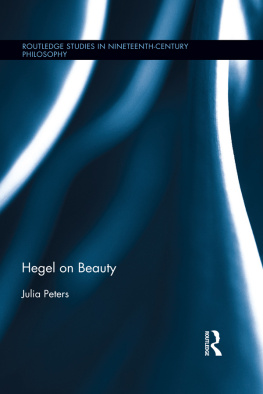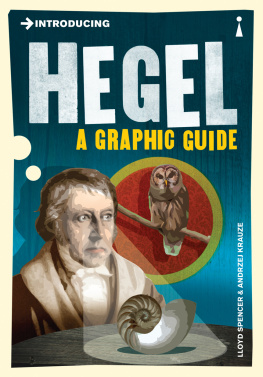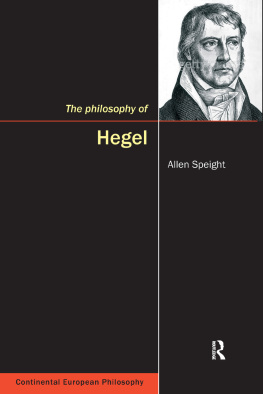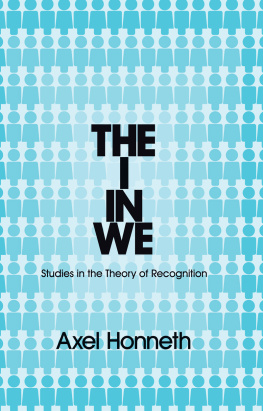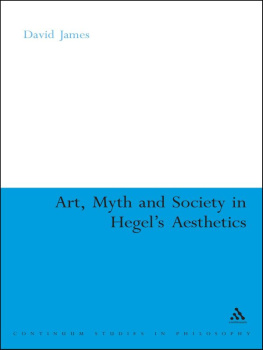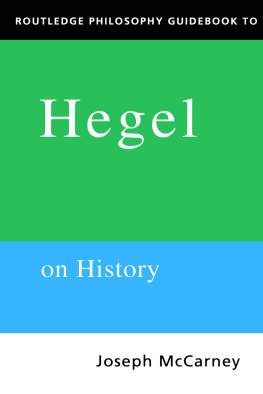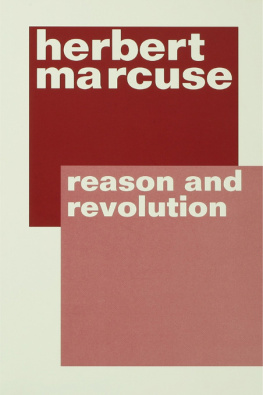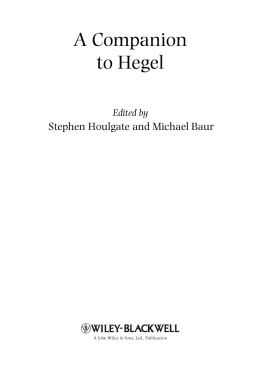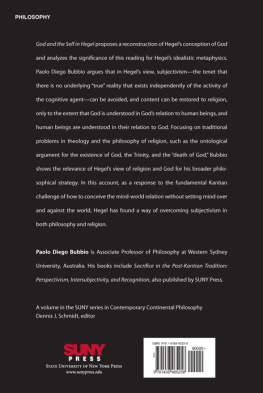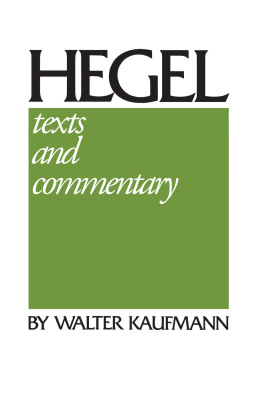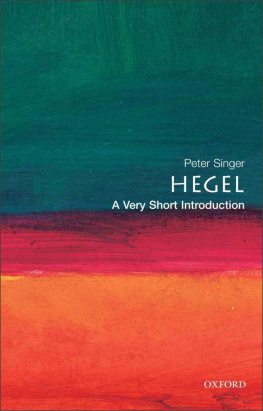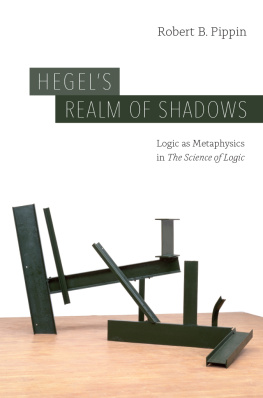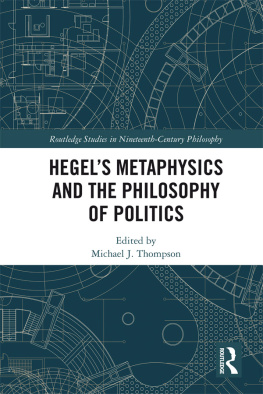Guide

Hegel and Metaphysics
Hegel-Jahrbuch Sonderband

Herausgegeben von Andreas Arndt, Myriam Gerhard und Jure Zovko
Band 7

ISBN 978-3-11-042723-3
e-ISBN (PDF) 978-3-11-042444-7
e-ISBN (EPUB) 978-3-11-042463-8
ISSN 2199-8167
Library of Congress Cataloging-in-Publication Data
A CIP catalog record for this book has been applied for at the Library of Congress.
Bibliographic information published by the Deutsche Nationalbibliothek
The Deutsche Nationalbibliothek lists this publication in the Deutsche Nationalbibliografie;
detailed bibliographic data are available on the Internet at http://dnb.dnb.de.
2016 Walter de Gruyter GmbH, Berlin/Boston
www.degruyter.com
List of Abbreviations
Hegel
| Briefe | Briefe von und an Hegel (vols 14.2) |
| Differenz | Differenz des Fichte schen und Schelling schen Systems der Philosophie |
| Enc | Encyklopdie der Philosophischen Wissenschaften 1830 |
| Enc 1817 | Encyklopdie der Philosophischen Wissenschaften 1817 |
| Enc 1827 | Encyklopdie der Philosophischen Wissenschaften 1827 |
| Gl&Wi | Glauben und Wissen |
| GW | Hegel, Gesammelte Werke |
| PhG | System der Wissenschaft. Erster Theil, die Phnomenologie des Geistes |
| RPh | Naturrecht und Staatswissenschaft im Grundrisse. Grundlinien der Philosophie des Rechts |
| TWA | Hegel. Werke in zwanzig Bnden. Theorie Werkausgabe |
| V | Vorlesungen. Ausgewhlte Nachschriften und Manuskripte |
| VGeist | Vorlesungen ber die Philosophie des Geistes ( V 13) |
| VGesch | Vorlesungen ber die Philosophie der Weltgeschichte ( V 12) |
| VGPh | Vorlesungen ber die Geschichte der Philosophie ( V 69) |
| VRel | Vorlesungen ber die Philosophie der Religion ( V 35) |
| WL | Wissenschaft der Logik |
Kant
| AA | Kants gesammelte Schriften ( Akademiesausgabe ) |
| KpV | Kritik der praktischen Vernunft ( AA V) |
| KrV | Kritik der reinen Vernunft ( AA III, IV) |
| KU | Kritik der Urteilskraft ( AA V) |
| MAN | Metaphysische Anfangsgrnde der Naturwissenschaften ( AA IV) |
| Prol | Prolegomena zu einer jeden knftigen Metaphysik, die als wissenschaftlich wird auftreten knnen ( AA IV) |
Marx, Engels
Allegra de Laurentiis
Introduction
The thirteen essays here collected were first presented at the twenty-third meeting of the Hegel Society of America, held from October 31 to November 2, 2014 at Northwestern University in Evanston, Illinois.
The conference title was Hegel Without Metaphysics? but this collection bears the title Hegel and Metaphysics in acknowledgement of the fact that all of the presenters, though from different perspectives and to different degrees, answered the question in the negative. They broadly acknowledged that Hegels system, tough certainly not every subsection of it, is an integral part of the controversial history of western metaphysicseven if, or rather because, Hegel intends to sublate that history in his philosophy.
Metaphysics : a very large tent of a word, at once a storeroom, house and sanctuary of colossal dimensions. It is perhaps not accidental that, just as Aristotles being, metaphysics has been and continues to be said in many ways. Beyond its role as the posthumous and rather fortuitous title of fourteen Aristotelian books, metaphysics has been practiced throughout the history of western philosophy under such disparate names as first philosophy, ontology, first science, theologyeven as science of logic.
Yet in the twentieth century, the history of metaphysics appeared to some as having come to an end. In the span of less than ten years philosophers who are thought to inhabit opposite regions of the philosophical landscape published seminal essays with identical titles and the same ambitious goal: Die berwindung der Metaphysik (Carnap in 1932, Heidegger in 1938/39). Analytically and continentally inspired thinkers have been wrestling ever since with various alternatives: ignoring metaphysical problems, renaming them, dissolving them into questions of language, ideologizing them, setting them up in strawman arguments (say, the canons alleged forgetfulness of Being), or boldly declaring them to be remnants of the history of nonsense.
As the essays here presented demonstrate, this fury of destruction did not last long past the end of the last century. Recent analytic philosophy does not label as merely metaphysical every problem that science cannot solve. It is seriously committed to inquiry into ontological themes ( entia , qualia , thinghood, mind) while it qualifies its research as (purely) formal ontology or (merely) descriptive metaphysics in order to ensure minimal contamination by the perceived insanity of historical metaphysica generalis . While the anti-metaphysical rhetoric of influential strands of existential phenomenology has been even stronger than that of its original neopositivist contenders, its simultaneous embrace of the themes and concepts of metaphysica specialis appears to have been (and to still be) impassioned. Dramatic calls to overcome onto-theology (believed to be coextensive with metaphysics tout court ), for example, have generated equally dramatic returns to what Kant would have called a metaphysics as mere rhapsody concerning The Event, or what Hegel would have identified as a return to the pre-critical thinking of the essentialities ( die Wesenheiten ) of things.
Even so, Hegels own criticism of metaphysical theorizing, on the one hand, and his pervasive incorporation of metaphysical concepts and deductions into his account of the real, on the other, present scholars with highly challenging problems (to use an understatement). With regard to the first of these issues, Hegels judgments about metaphysics as a discipline include, to choose but one example, both the chastisement of old metaphysics and the glorification of Aristotles De anima as the only work of speculative interest written on the soul in two millennia. Thus one might have to conclude that old or hitherto metaphysics is not meant to refer to Greek thought but only to Scholastic and pre-critical metaphysics.
With regard to the second issue, i.e., the vital role of metaphysical notions in the philosophies of nature and of spirit, an even moderately close reading of the texts shows that the Realphilosophie is neither merely prefaced by nor only schematically built upon the science of thought thinking itself. At every step, the Logics categories and their necessary connections bleed into the conceptual sequencing, the arguments, and the detailed accounts of the most familiarand indeed prosaicphenomena of the mechanical, physico-chemical and organic systems of nature, as well as into those of spirit in its subjective, objective, and absolute dimensions. The natural psyche, to name a familiar phenomenon not as central to the Philosophy of Spirit as, say, consciousness or right (only appearing as it does in the first subsection of the first division of the third part of the system) is a reality that Hegel explains in terms of its Being (the sentient soul), its Essence (the soul feeling her sentience), and its full-fledged Concept (the actuality of fully active soul).


